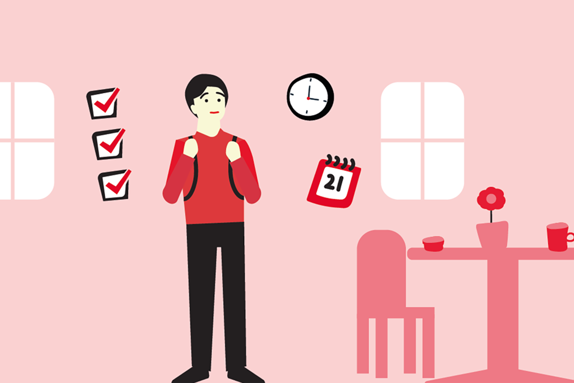
How to recover from a crisis
How to recover from a crisis
Difficult incidents can cause us to lose our footing and feel bad about it. Here are some advice on how to recover after a crisis.
Stress, different crisis and grief are natural parts of life. Most people recover from these challenges with support of those around them.
Recovery is about finding your way back to a feeling of control over your life and a meaningful existence – whether through work, relationships, community engagement or something else. Remember that recovery is individual and can take different forms.
When you find yourself in a difficult situation, it can be challenging to take actions to feel better. Here are six tools to sort out where and how to start. You can use these tools yourself, but it’s even better to do these exercises with someone. There’s no harm in testing these tools to see if they are helpful to you.
1. Identify your needs
Go through what is most important for you to improve to feel better – preferably together with someone you trust. It can often be difficult to gain an understanding of the whole situation. That’s why it’s a good idea to start with the “big picture” and think about what works well and what could be improved. Some things are important to fix right away, while others may take a little more time.
Areas to check off can include your physical health, safety and security, whether you are eating and sleeping enough, your finances, how you are coping with everyday life, your relationships, alcohol and drugs and other things that could be a source of concern.
Once you’ve made a general assessment, prioritise what is most important to take a hold of first. In that way, you can avoid landing in new difficult situations, such as forgetting to renew your medication prescription or deal with your bills.
It’s very normal to feel incapable when you write all of your challenges down and you can see them more clearly - but try to be patient.

2. Get better at solving your problems
When you’re stressed, it can be difficult to find clear solutions to your problems. The situation may feel overwhelming, but breaking down and structuring your issues can make it easier to find a solution. Here's how you can do it:
- A big problem can often be divided into smaller problems that are easier to deal with. Ask yourself the question: Is this problem happening to me, or is it playing out between me and someone else? If the answer to either option is yes, then you can work on it. If the answer is no, the problem is in someone else’s territory.
- Set a goal. What do you want to change, and what are the challenges? For example: “I wish I could get a job”, “I’m afraid of how my colleagues will react if I tell them”, or “I’d like to have my own place”.
- Brainstorm ideas about ways to deal with the problem. This is easiest to do when you team up with someone else.
- Evaluate your ideas and choose the most appropriate solution.

3. Be active
Physical activity, like hanging out with other people, spending time in nature, or doing things related to your interests are examples of positive things that can help you recover.
When you find yourself in a difficult situation, there is a risk that time, energy or finances will prevent you from continuing to do things that usually make you feel good. This makes you even more vulnerable to stress and worry. Adjust the amount and intensity of activity according to what you can handle at the moment.
You decide what is the best activity for you. Meeting others in a similar situation, making a phone call, or taking a walk with your neighbour can be just as good as exercise. Every time you fill your everyday life with positive activities, you are empowered. This power gives you better conditions for recovery and less room for worry and stress.
4. Manage your reactions
It’s normal to experience various unpleasant physical and emotional reactions when you’re feeling more stressed or unwell. Here are some advice on how to deal with them.
Translate thoughts and feelings into words
Writing about your situation can help you organise issues that seem messy and unstructured. Writing can also reduce the intensity of strong emotions and help you to better understand the situation, and what triggers your mood. Some people prefer to express themselves by painting, writing poems, or making a memory box or scrapbook.
Get enough sleep
Sleep problems can vary from troubles of falling asleep, waking up frequently in the night, to waking up too early or sleeping for a very long time. Here are some advice that might help:
- Be sure you have time to unwind before going to bed.
- Use routines that remind your body that it’s bedtime. Avoid blue light (from screens) just before bedtime. It’s better to read a book, take a shower, or listen to relaxing music.
- If you can’t fall asleep, don’t stay in bed. Get up, go to another room, and stay up for a while until you feel tired.
- Most people sleep better in a cool bedroom. It can also help to put a cool, damp cloth on your forehead or drink a cold glass of water.
- Avoid alcohol and caffeinated beverages.
- Worry about the future makes it hard to fall asleep. Observe what thoughts you have. Then let them go and try to focus on something pleasant instead.
Dealing with anger and aggression
Getting angry and showing anger is linked to stress in the body, and in some ways, it can be helpful and good. However, too much anger and strong expressions can create more stress, complicate your relationship with others, and reinforce the feeling that you have lost control. Ways to deal with your anger:
- Learn to understand which situations spark your anger and pay attention to early warning signs.
- Take a “time out” and do something completely different – take a walk or go into another room. A brief break can help you calm your body so that you can think clearly and find alternative ways to cope with the situation.
- Engage in physical or positive activities that help calm your body, such as relaxation exercises.
- Avoid alcohol and drugs.
- Seek professional help if you are unable to break a pattern of anger on your own, or if the reaction continues or worsens.
5. Manage your thoughts
Another important part of recovery is learning to identify unpleasant thoughts and counteract them through other, less worrying ones. Dwelling on something negative or brooding on a thought can take a lot of energy.
Your thoughts affect your feelings. If you think angry thoughts, they will create angry emotions. Worrying thoughts can create feelings of worry, and hopeless thoughts feelings of hopelessness – but in the same way, calming thoughts can create a sense of calm.
Start by identifying thoughts that aren´t helpful to you. Thoughts that may be realistic, such as “A fire could break out” or “My illness may worsen”, can carry an unspoken assumption that you will not be able to handle the situation. Thus, even if an idea is reasonable, it is not necessarily helpful and can create more anxiety.
The next step is to identify thoughts that are helpful, like “If a fire breaks out, I know where the fire extinguisher is and I have a plan for what to do”, and “If my illness worsens, I will call my friend who will help me contact the healthcare centre”. This can give you more control and help to calm you down.
6. Prioritise social interaction
When you feel bad, relationships with others become more important. Since we are dependent on others in our everyday lives, they are also important for our recovery – both in terms of expressing our feelings and getting practical help.
At the same time, relationships with others can become more difficult when you feel mentally unwell. Many describe feeling different and outside the context in which they would normally belong, as if they no longer fit in.
Other reasons for not seeking out social interaction when you are not feeling good:
- You do not know what you need, or if it helps to get support.
- You are afraid of losing control.
- You feel unsure about how much you need to tell them about your situation.
- You do not want to be a burden to others or are worried that others will not understand.
- You are afraid of other people’s reactions or judgments.
We also differ in terms of how much we want to talk about a tough situation. Sometimes it can be nice to hang out with people who know about your situation, even if you don´t want to talk about it at the time. It can also be liberating to meet people who don´t know how you are feeling. Practicing what and how you tell others about what you are going through can facilitate social interactions.
Make a network map
A network map can help you get an overview of your social contacts. Think of all your relationships as an atom or a solar system. You are in the middle, and all your contacts with whom you interact are circulating around you at different times and at different distances. In addition to family and friends, also include former childhood friends, colleagues, healthcare professionals, or people you know who share your interests. Once the map is ready, ask yourself the following questions:
- With whom can you share your experiences and emotions?
- Who can provide practical support?
- With whom can you do fun things, without having to talk about your situation?
- Who might be in need of your support right now?
- Do you want to increase your social interactions, or are there relationships with certain contacts you want to improve?
- Who do you want to spend more time with?
The map can help you discover contacts with whom you want a closer relationship, or people with whom you would prefer to spend less time for a while. It can also help you identify what you want to improve in your network.
If the tools don´t help
Self-help advice is a good thing. It can increase your sense of control, but sometimes the situation is so difficult that self-help advice is not enough. Be wary of if advice instead fuel your feelings of hopelessness. When self-help advice doesn´t work, it can be a sign that you need more support. That it is time to contact your healthcare system for an assessment and further help.
